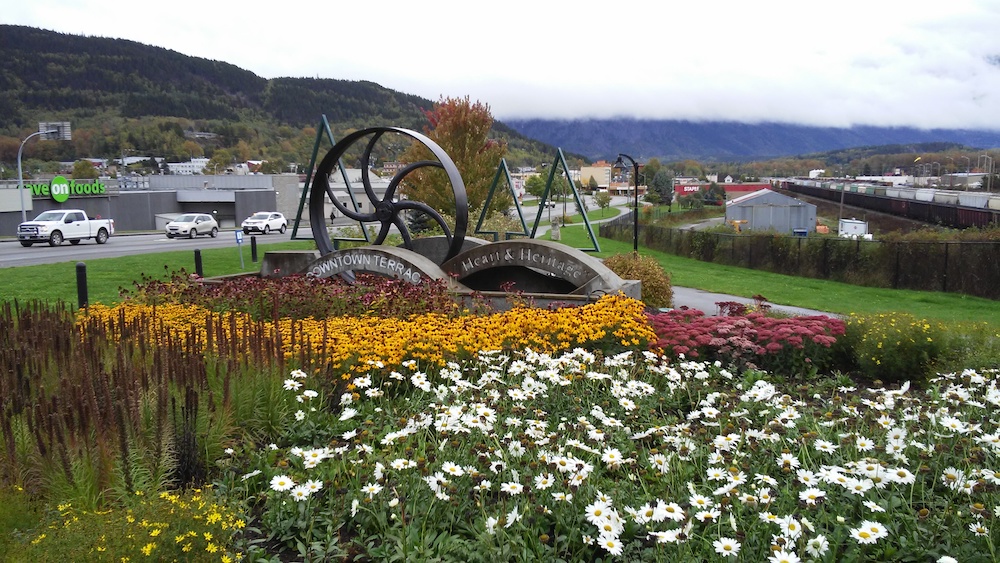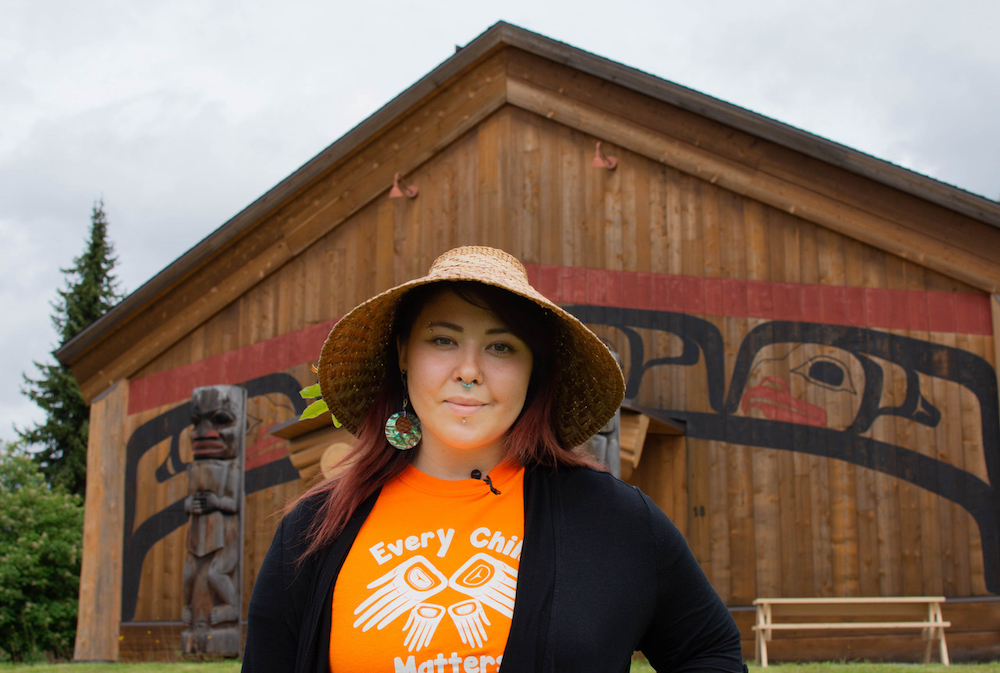A former Terrace councillor is speaking out about feeling suicidal, traumatized and silenced after she talked to media about violence against Indigenous women.
Jessica McCallum-Miller became the northern city’s youngest and first Indigenous councillor when she was elected in October 2018.
She stepped down in February, saying “systemic and internalized racism, as well as sexism, had played a role in the inability of my colleagues to respect and understand my personal and diverse perspectives.”
“I can no longer endure the mental and spiritual hardships of explaining this and ultimately being unsupported by those I work with.”
Five months later, McCallum-Miller is now speaking about her time on council. She told The Tyee she believes fellow councillors and the mayor wanted to silence her after she spoke to the CBC for a series about domestic violence.
She expressed concern about how industrial growth in the region could negatively impact Indigenous women and was immediately attacked by others on council, she said.
“I felt like I really didn’t have allyship amongst the rest of council,” says McCallum-Miller, who is of Gitxsan, Wet’suwet’en and Nisga’a descent.
“I represented demographics on that council that have never been represented, ever. So, it was very hard for me to bring new initiatives when I’m part of a new generation, I’m Indigenous and I’m a young woman.”
Terrace, which has a population of about 15,000, sits 60 kilometres north of Kitimat, where LNG Canada’s liquefied natural gas terminal is under construction, and 150 kilometres east of Prince Rupert, which has seen rapid port expansion over the past decade. The industrial expansion, including the Coastal GasLink pipeline, has brought increased social pressures, rising housing costs and homelessness. But Terrace has not benefited from direct tax revenue from the projects, putting a strain on the city’s services.
McCallum-Miller says her role on council was never easy but things became more difficult following the March 2020 interview, which focused on Kitimat’s LNG development and the need for more services for women fleeing violence.
McCallum-Miller shared her own experience of being harassed by unknown men in Terrace and expressed concern that issues of domestic and sexual violence were being “swept under the rug.” The article included a photo of her in the council chambers.
She says the day the article was published, Coun. James Cordeiro made a formal complaint against her and suggested she be investigated.
Cordeiro declined to comment, saying “the complaint filed speaks for itself.” He also refused to share the complaint with The Tyee.
“I’m not going to be leaking you an internal document as doing so would be unethical and a violation of city policy,” he wrote in an email. “You should follow proper procedures and file an FOI request.”
McCallum-Miller is unclear what an investigation would have entailed, saying she was given few details, but was told it would have allowed other council members to determine disciplinary actions, such as a suspension from council and being barred from speaking to media.
“I don’t feel that I should be under an internal investigation for caring about the safety of Indigenous women and girls in our community,” she said, adding that the issue is “really close to my heart.”
“It was to silence me.”
She says she was also called into the mayor’s office, where it was suggested that she take a paid leave from her position. “I felt like that was further silencing me,” she says.
Terrace Mayor Carol Leclerc declined an interview request but said in an emailed response to The Tyee’s questions that her suggestion McCallum-Miller take a leave of absence was made with the former councillor’s personal well-being in mind.
She would not provide details about the complaint against McCallum-Miller, but said city council’s media protocol is that the mayor acts as spokesperson and that McCallum-Miller violated its code of ethics by doing an interview in the council chambers.
“It wasn’t made clear in the interview that this was a personal opinion,” Leclerc said. Section 13 of the city’s Council Code of Ethics states that when councillors are presenting “their individual opinions and positions, they shall explicitly state they do not represent council or the City of Terrace, nor will they allow the inference that they do.”
Complaints about a breach of ethics must be presented in writing to the mayor, the document says, with the mayor either investigating or establishing a committee of three councillors to investigate. Possible sanctions include removal from duties, removal from speaking on behalf of the city and restrictions from travelling on city business.
McCallum-Miller says she received permission from city administration to use the council chambers but didn’t run her plans past the mayor.
She says she believes other councillors felt the interview was a deliberate attack on local industry.
“I think they thought that I was trying to disrupt the relationship of LNG [Canada] and Terrace,” she says. “It was even suggested that I apologize to the LNG representative.”
McCallum-Miller says Cordeiro suggested council send an apology letter to LNG Canada following the article’s publication. It’s unclear whether that happened. Leclerc says no official correspondence was sent by her and she’s not aware of any councillor sending a personal note.
Despite feeling abandoned by her fellow council members, McCallum-Miller says she continued attending meetings and the complaint was eventually withdrawn.
But she describes feeling alienated from council as she attempted to get her colleagues to recognize the concerns of neighbouring First Nations and the need for cultural sensitivity following what she describes as derogatory comments in a council meeting. In February, she decided to step down.
“When I took issue with [the comments], no one else did, and that showed me that they were complicit with that behaviour,” she says.
“I just felt really alone.”

While she may have been a lone voice on council, McCallum-Miller is not alone in expressing concern about the effects of industry on Indigenous women. The final report from the National Inquiry into Missing and Murdered Indigenous Women and Girls, released in 2019, dedicates a chapter to resource extraction projects and their connection to violence against women.
It describes “boom” towns and work camps as places with increased drug and alcohol-related offences, sexual offences, domestic violence and gang violence, saying there is “substantial” evidence of the correlation between resource extraction and violence against Indigenous women and girls.
“The influx of people as a result of ‘man camps’ near or within Indigenous, remote and rural communities further results in stress on already limited social infrastructure, such as policing, health, and mental health services,” the report says.
A 2018 report by B.C.’s Northern Health Authority also cites a “growing body of evidence” that natural resource development results in adverse social, economic and cultural impacts in northern communities.
Like McCallum-Miller, other City of Terrace officials have expressed concerns about the increasing strain industry is putting on the city’s social services.
In a 2019 interview with the Terrace Standard, former chief administrative officer Heather Avison expressed frustration that LNG Canada wasn’t stepping up to provide more resources to the community, which has experienced increased demand for social housing, as well as more calls for services like policing and ambulance.
The same week, Leclerc spoke with The Tyee about how the opioid crisis, coupled with rising real estate prices, were compounding Terrace’s need for social housing.
“We lack the resources. We are so under-resourced compared to what Victoria or the Lower Mainland have,” she said.
Frank Leonard, a local government consultant who spent nearly 30 years on Saanich council, including 18 years as mayor, says it’s considered a courtesy for municipal councillors to give the mayor a heads up before speaking with media. He also emphasizes the importance of elected officials making it clear that they aren’t speaking on behalf of council.
But he adds that McCallum-Miller did little — if anything — wrong in her interview with the CBC.
“In hindsight, the optics would have been better if she’d given the interview anywhere but in the council chamber, given she was just expressing her own point of view,” he says. “But I think her expressing her opinion based on her life experience, you’re allowed to do that.”
He says the complaint likely never went anywhere because it lacked substance.
McCallum-Miller says that five months after stepping down, she is ready to talk about her experience, describing her healing process as “about a third of the way there.” She says she has found support from her Elders, fellow advocates, her partner and Coast Mountain College’s Freda Diesing School of Northwest Coast Art, where she recently graduated.
In April, McCallum-Miller was awarded the Lieutenant Governor’s Medal for Inclusion, Democracy and Reconciliation after being nominated by Jillian Stephens, a First Nations access co-ordinator with the college.
She was the perfect candidate, Stephens says.
“When the award nomination period came around, I thought of only one person who has been incredibly resilient in the values of inclusion, democracy and reconciliation, especially during the pandemic,” she says.
“I believe Jessica has strengthened democracy through civic engagement and the advancement of human rights. Jessica has demonstrated recognition for fundamental rights and dignity for all persons at a local, national and global level by illuminating the systemic issues within the City of Terrace and the northwest.”
McCallum-Miller says she’ll continue to speak out about her experience.
“I’m not going to hide it anymore,” she says. “If it makes people uncomfortable, I’m glad that it makes them uncomfortable because women — Indigenous women — need to be recognized for their contributions for lifting up their communities.
“They should not be pushed away from leadership positions just because of someone else’s prejudice.” ![]()
Read more: Indigenous, Rights + Justice, Municipal Politics
















Tyee Commenting Guidelines
Comments that violate guidelines risk being deleted, and violations may result in a temporary or permanent user ban. Maintain the spirit of good conversation to stay in the discussion.
*Please note The Tyee is not a forum for spreading misinformation about COVID-19, denying its existence or minimizing its risk to public health.
Do:
Do not: